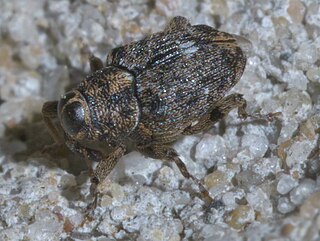Acratus is a genus of primitive weevils in the family of beetles known as Brentidae. There are at least 30 described species in Acratus.
Phocylides is a genus of primitive weevils in the family of beetles known as Brentidae. There is at least one described species in Phocylides, P. bicolor.
Pseudoceocephalini is a tribe of primitive weevils in the family of beetles known as Brentidae. There are at least 40 genera and 150 described species in Pseudoceocephalini.
Acratini is a tribe of primitive weevils in the family of beetles known as Brentidae. There are about 12 genera and at least 110 described species in Acratini.

Eutrichapion viciae is a species of pear-shaped weevil in the family of beetles known as Brentidae.

Eutrichapion is a genus of pear-shaped weevils in the family of beetles known as Brentidae. There are about eight described species in Eutrichapion.

Apioninae is a subfamily of pear-shaped weevils in the family of beetles known as Brentidae. There are at least 20 genera and 80 described species in Apioninae.

Conoderinae is a subfamily of true weevils in the beetle family Curculionidae. There are more than 210 genera in 15 tribes, and about 2,400 described species in Conoderinae.

Omphalapion hookerorum is a species of pear-shaped weevil in the family of beetles known as Brentidae.

Omphalapion is a genus of pear-shaped weevils in the family of beetles known as Brentidae. There are about five described species in Omphalapion.

Perapion curtirostre is a species of pear-shaped weevil in the family of beetles known as Brentidae.

Perapion is a genus of pear-shaped weevils in the family of beetles known as Brentidae. There are about 12 described species in Perapion.

Stenopterapion meliloti is a species of pear-shaped weevil in the family of beetles known as Brentidae.

Stenopterapion is a genus of pear-shaped weevils in the family of beetles known as Brentidae. There are about six described species in Stenopterapion.

Attelabinae is a subfamily of leaf-rolling weevils in the family of beetles known as Attelabidae. There are at least four genera and about five described species in Attelabinae.

Cyladinae is a subfamily of sweet potato weevils in the family of beetles known as Brentidae. There are two genera in Cyladinae, Cylas Latreille 1802, and the extinct genus Miocenocylas Legalov 2018.

Derelomini is a tribe of true weevils in the family of beetles known as Curculionidae. There are about five genera and eight described species in Derelomini.
Orthognathini is a tribe of true weevils in the family of beetles known as Curculionidae.
Raymondionyminae is a subfamily of snout and bark beetles in the family Brachyceridae. There are at least three genera and two described species in Raymondionyminae.
Trachelizini is a tribe of primitive weevils in the family of beetles known as Brentidae. There are at least 100 genera in Trachelizini.








